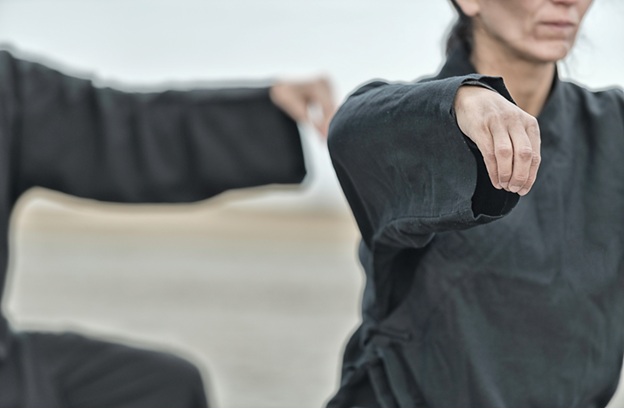So you want to be a mingjue teacher?
Teaching mingjue is not an action or a duty. It’s a way for your pure consciousness to continually train its functions. This manifests not only in any formal teaching sessions, but in how you navigate the inevitable complexities that arise while guiding others in their healing or awakening process. Whether you have one student or a hundred, your primary awareness is always to keep your own mingjue stable, flexible, and centered within.
Being centered in mingjue is the only true way to serve, because your mingjue state creates and contributes to the field for your students. So your mingjue presence and stability are your greatest nourishment and your greatest teaching tool. Mingjue is, after all, your Inner Teacher.

How to begin
Teaching from mingjue begins with playful flexibility, and flexibility begins with relaxing any attachments to experiences that arise—your students’ responses, your own experiences, and any special abilities that may develop.
The mingjue teacher observes everything in a free state. This includes successful or difficult classes, student interactions, moments of profound connection, and times when nothing seems to flow. To mingjue eyes, a student’s complaint, gratitude, or confusion are seen as equal and neutral, like the natural phenomena of clouds passing across the sky. The mingjue teacher can, in fact, play with difficult situations. Like laughing and asking, “Why am I taking this student’s resistance so seriously?”
The mingjue teacher observes class dynamics with a pure baby heart, free of judgment. You observe your own internal resistances, and relax the urge to push students to change according to a timeline. Instead, you know that true transformation cannot be achieved by demanding someone to wake up or heal faster, even if your intentions seem loving. The more you want to change others, the more their reference frameworks will feel judged and want to protect themselves.
The Most Important Relationship
The primary relationship is mingjue with itself—for you to know yourself as the Inner Observer, stable and present, regardless of external circumstances. This relationship refers to your consciousness with itself, and also merged with the infinite collective consciousness field.
As a mingjue teacher, you come to know that every teaching experience is, in essence, about your own inner state. Every difficult student, every moment of self-doubt, every breakthrough or seeming failure—they are all reflections of your own consciousness and opportunities for the Inner Observer to observe itself more clearly. For example, if you feel triggered by a student’s criticism or frustrated by another teacher, this is simply feedback about the flexibility of your reference framework, as well as the stability of your mingjue state. Those who challenge you the most are guideposts showing you where your attachments or rigidity still lie.
So, can you stay playful when things don’t go as planned? Can you laugh at yourself instead of taking things so seriously? If your sessions or relationships continue to feel difficult, can you see how your mingjue has co-created these situations so it can “grow up” and develop true mastery
Six Qualities of Mingjue Teachers
The mingjue teacher is a lifelong student. The following qualities are essential to cultivate on a continual basis:
1. Investigate consciousness and qi science—develop a genuine curiosity about the laws of consciousness and how they manifest in daily life. This isn’t an academic study. It’s a deep inquiry into the nature of awareness itself.
2. Return to mingjue—truly understand that coming to your Inner Observer is the most important thing in life, because this is your True Self. Relax any attachments you have on being seen as a good teacher or having a lot of students.
3. Embody wisdom and universal love—when you stay in a clear and peaceful mingjue state, you naturally develop wisdom and express the four aspects of good character: mingjue love, mingjue peace, mingjue happiness, and mingjue gratitude. You come to embody the “haola spirit.”
4. Study the theories and methods—know these with great clarity. Can you explain consciousness principles effectively? Can you guide methods in a way that quickly benefits students? Your understanding should be so clear that it becomes contagious. And if you don’t yet have clarity on certain theories or methods, go deeper into them; ask other teachers for guidance; and in the meantime, teach the more general aspects of consciousness and qi science until you have more clarity.
5. Become a healer—all mingjue teachers should become healers, too, because healing practices can improve your mingjue function. This means to use your mingjue state to create healing fields, whether you’re working one-on-one or with groups. Relax any tendencies to fixate on the methods themselves, as well as the results; simply see healing as another way to train your mingjue to send the information of mingjue love and peace.
6. Resolve conflicts without drama—if you have an inner conflict, promptly recognize it, see through it, then move beyond it. Teaching is a practice in mingjue relationships. When your students have conflicts, help them open their hearts without getting fixed by the stories. Stay in a good mingjue state and use wisdom to create harmony and play.
Navigating Super Abilities: A Word of Caution
What happens when super abilities arise in your practice? These abilities—receiving information directly, like a transmission, and knowing things beyond the ordinary senses and perceptions—are natural manifestations of mingjue training. This information can serve as useful tools to see life more broadly and deeply. But for mingjue teachers, they can also become the greatest trap.
One of the reasons why they can trap you is because you may feel more special or powerful than others. You can also become distracted by the information that’s emerging, and therefore lose yourself to it. Super abilities, then, can take you out of the mingjue-centered state, and you can become fixed by the very gifts that arose from the mingjue field.
It’s important, therefore, to always merge with the collective field. Without the collective field, super abilities can develop into super-egos. In the field, you know that everyone has the same potential. And any information you receive is not because you’re a “channel” for other masters or beings. You are pure consciousness, and you’re receiving this information directly from the field.
When your mingjue is stable and clear enough, you can use information, whether received through super or ordinary abilities, in a free and flexible way. Just as with other phenomena, super abilities are but a function of mingjue. Mingjue is always the master.
Practical Guidelines for Teachers
1. Keep it simple—the essence of our practice is mingjue connecting to pure qi in our bodies and in the universe, and to gather the purest qi of the universe to nourish life; it’s not about connecting to energy from specific things. While you can experience the qi of animals or different landscapes, or maybe you know the five elements qigong or yin-yang qigong, don’t make these your primary focus. When you practice with the qi of different things, the practice becomes complex, and therefore more limited. It’s easy to lose the entirety (oneness) state of things, which is the foundation of mingjue practice.
2. Stay flexible and playful—notice when you become rigid about how things “should” go in your teaching. Practice observing challenging students as opportunities to strengthen your mingjue flexibility. Remember that whether it’s one student or a hundred, your state remains the same.
3. Don’t get fixed by results—whether your students love your teaching or complain, maintain the same inner stability. Use criticism and praise equally as information, not as measures of your worth. Stay connected to the joy of sharing consciousness work, regardless of external responses, while also learning from the feedback on places you can further develop your mingjue functions.
4. Handle special experiences wisely—if super abilities arise, treat them as normal functions, not as proof that you or your students are special. Continue returning to direct observation of the entirety (oneness) state, both yours and your students’, rather than teaching mystical experiences or introducing other spiritual frameworks.
5. Abstain from politics and other dualistic agendas—consciousness teaching is not used to change someone’s politics or push other social agendas. Trust that, as more people come to their True Self, the world naturally evolves in a more harmonious way. Focus on spreading the mingjue love state, rather than fixing external problems.
6. Maintain the purity of mingjue practice—continue connecting to pure consciousness in mingjue teaching sessions, rather than getting fascinated or distracted by other phenomena, including super abilities, mystical concepts, or other consciousness frameworks. Trust yourself, rather than creating elaborate spiritual stories about your experiences. Remember that you are the pure, clear mingjue—light, peaceful, free, playful, joyful. This is the essence.
Your Greatest Teaching
Here is the golden key: your mingjue state is your teaching. When your mingjue state is pure, simple, and stable, you create a flowing field that naturally supports others in finding their own inner stability—and their own Inner Teacher. In this beautiful state, you are managing your own energy, practicing mingjue and qi, and also serving others.
This is the greatest gift you can give yourself, your students, and the world.
Adapted from Teacher Wei Qifeng’s Instructions for Mingjue Teachers session, Feb 16, 2025.
